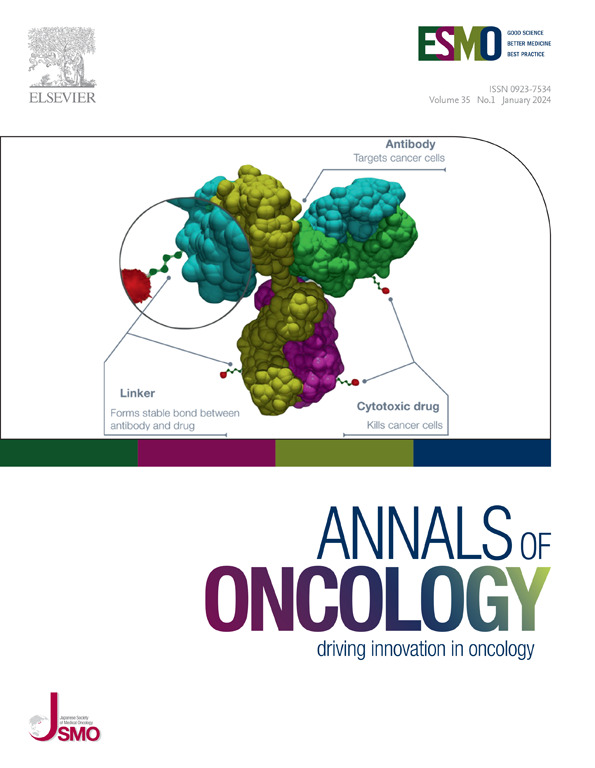Predicting dose response to prostate cancer radiotherapy: validation of a radiation signature in the randomized phase III NRG/RTOG 0126 and SAKK 09/10 trials
IF 56.7
1区 医学
Q1 ONCOLOGY
引用次数: 0
Abstract
Background
The SAKK 09/10 trial randomized biochemically recurrent prostate cancer patients to salvage radiation 64 Gy versus 70 Gy, and the NRG/RTOG 0126 randomized intermediate-risk prostate cancer patients to definitive radiation 70.2 Gy versus 79.2 Gy. We investigated a previously developed Post-Operative Radiation Therapy Outcomes Score (PORTOS) to identify preferential benefit from radiation dose escalation (DE).
Materials and methods
PORTOS was evaluated in patients enrolled in SAKK 09/10 and NRG/RTOG 0126 with available tissue that passed quality control (n = 226, 215). PORTOS was evaluated in the published post-operative groups in SAKK 09/10 and in tertiles in NRG/RTOG 0126 as cut-offs had not been established for biopsy samples and definitive radiation patients. Clinical and molecular correlates in a real-world dataset of 42 407 prostatectomy and 31 107 biopsy samples were also analyzed.
Results
In SAKK 09/10, the biomarker-treatment interaction was statistically significant between PORTOS (lower versus higher) and treatment arm for clinical progression-free survival. Only patients in the higher PORTOS group benefited from DE. In NRG/RTOG 0126, in patients with a lower tertile PORTOS, there was no difference in Phoenix biochemical failure (BF). However, for patients in the average and higher tertile PORTOS range, there was a significant benefit for DE for Phoenix BF. An interaction test indicated a significant difference in benefit for DE between higher and lower PORTOS groups. PORTOS was not strongly associated with clinicopathological variables in either trial or the large real-world dataset. In the latter, PORTOS was modestly associated with hypoxia signatures and strongly associated with immune signatures and subtypes.
Conclusion
In the SAKK 09/10 and RTOG 0126 randomized controlled trials, we demonstrated that PORTOS can potentially identify a subset of patients who benefit from DE, a subgroup that cannot be identified using clinicopathological or prognostic variables. These results suggest that PORTOS could be used clinically as a predictor of radiation response.
预测前列腺癌放疗的剂量反应:随机III期NRG/RTOG 0126和SAKK 09/10试验中辐射特征的验证
背景:SAKK 09/10试验将生化复发前列腺癌患者随机分配到64 Gy和70 Gy的补救性放疗,NRG/RTOG 0126试验将中危前列腺癌患者随机分配到70.2 Gy和79.2 Gy的最终放疗。我们研究了先前开发的术后放射治疗结果评分(PORTOS),以确定放射剂量递增(DE)的优先获益。材料和方法:在SAKK 09/10和NRG/RTOG 0126中选取质量控制合格的可用组织对PORTOS进行评估(n = 226, 215)。在SAKK 09/10中公布的术后组和NRG/RTOG 0126中公布的三分之一的PORTOS进行了评估,因为活检样本和最终放射患者的临界值尚未建立。我们还分析了42 407例前列腺切除术和31 107例活检样本的临床和分子相关性。结果:在SAKK 09/10中,生物标志物-治疗相互作用在PORTOS(较低vs较高)和治疗组的临床无进展生存之间具有统计学意义。在NRG/RTOG 0126中,低胎位PORTOS患者的Phoenix生化失败(BF)没有差异。然而,对于平均和更高胎数PORTOS范围内的患者,DE对Phoenix BF有显著的益处。相互作用试验表明,高和低PORTOS组之间DE的效益有显著差异。无论在试验中还是在大型真实数据集中,PORTOS与临床病理变量都没有很强的相关性。在后者中,PORTOS与缺氧特征适度相关,与免疫特征和亚型密切相关。结论:在SAKK 09/10和RTOG 0126随机对照试验中,我们证明了PORTOS可以潜在地识别出受益于DE的患者亚群,这一亚群无法通过临床病理或预后变量来识别。这些结果表明,PORTOS可作为临床放射反应的预测指标。
本文章由计算机程序翻译,如有差异,请以英文原文为准。
求助全文
约1分钟内获得全文
求助全文
来源期刊

Annals of Oncology
医学-肿瘤学
CiteScore
63.90
自引率
1.00%
发文量
3712
审稿时长
2-3 weeks
期刊介绍:
Annals of Oncology, the official journal of the European Society for Medical Oncology and the Japanese Society of Medical Oncology, offers rapid and efficient peer-reviewed publications on innovative cancer treatments and translational research in oncology and precision medicine.
The journal primarily focuses on areas such as systemic anticancer therapy, with a specific emphasis on molecular targeted agents and new immune therapies. We also welcome randomized trials, including negative results, as well as top-level guidelines. Additionally, we encourage submissions in emerging fields that are crucial to personalized medicine, such as molecular pathology, bioinformatics, modern statistics, and biotechnologies. Manuscripts related to radiotherapy, surgery, and pediatrics will be considered if they demonstrate a clear interaction with any of the aforementioned fields or if they present groundbreaking findings.
Our international editorial board comprises renowned experts who are leaders in their respective fields. Through Annals of Oncology, we strive to provide the most effective communication on the dynamic and ever-evolving global oncology landscape.
 求助内容:
求助内容: 应助结果提醒方式:
应助结果提醒方式:


